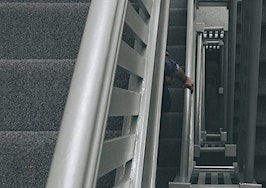Takeaways:
- Today’s typical first-time buyer is actually a single person in his or her early 30s, toward the front end of the millennial generation.
- By comparison, in the late 1980s, 52 percent of first-time buyers were married.
- Americans are buying increasingly expensive first homes and spending more relative to their incomes than any time in the past 40 years, Zillow said.
What does the average first-time homebuyer look like? It’s not a young couple fresh off their wedding and looking to establish a homestead for a growing family, as has been the norm in recent decades, according to Zillow.
The online real estate marketplace’s analysis of first-time homebuyers finds that today’s typical first-time buyer is actually a single person in his or her early 30s, toward the front end of the millennial generation.
That’s because, as noted by many economists and analysts, millennials are slow to establish “traditional” households, Zillow said.
“Millennials are delaying all kinds of major life decisions, like getting married and having kids, so it makes sense that they would also delay buying a home,” said Zillow Chief Economist Dr. Svenja Gudell.
According to Zillow’s estimates, average first-time buyers are about 33 years old and unmarried. By comparison, in the late 1980s, 52 percent of first-time buyers were married.
The median income of today’s first-time buyers is $54,340, which is about the same as what first-time homebuyers made in the 1970s, when adjusted for inflation. Still, Americans are buying increasingly expensive first homes and spending more relative to their incomes than any time in the past 40 years, Zillow said.
Some buyers are purchasing homes that cost 2.6 times their annual income, compared with buyers in the ’70s, who bought homes that cost about 1.7 times their yearly income.
Today’s buyers also tend to rent longer than buyers did in the past. Zillow’s study found that Americans are renting for an average of six years before buying their first homes. In the 1970s, they rented for an average of 2.6 years.
This could be because millennials are more likely to move around and test the employment waters in different metropolitan areas, Zillow said. However, Gudell noted that rent costs are skyrocketing in many areas, and this could become an unaffordable option for many millennials.
If they do decide to venture into homebuying, “The last hurdle will be finding a home they like amidst very tight inventory, especially among starter homes,” Gudell added.








